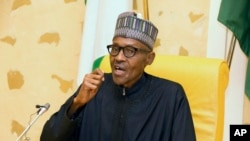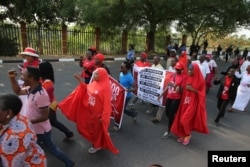The families of some 200 Chibok schoolgirls abducted by Boko Haram nearly three years ago celebrated the return of Nigerian President Muhammadu Buhari from seven weeks of medical treatment in Britain as a boost to hopes of their daughters being freed.
Shortly after arriving from London on Friday, the 74-year-old former general told officials he would need more rest and health tests, raising questions about his ability to run Africa's biggest economy and most populous nation.
Yet his return to the country sparked celebrations among families in Chibok, in northeast Nigeria, who had feared that his ill health and absence would harm negotiations with the jihadist group Boko Haram for the release of their daughters.
"Some of the parents cried" following rumors of Buhari's failing health after he left Nigeria in January, said Yana Galang, the women's leader of the Association of Parents of the Abducted Girls from Chibok.
"They said: 'If Buhari dies, we cannot get our missing daughters back,' " she told the Thomson Reuters Foundation by phone from Chibok, as several parents of the abducted girls gathered to share and celebrate the news of Buhari's return.
Some returnees
For more than two years there was no sign of the girls, whose kidnapping from their school at night sparked global outrage and a celebrity-backed campaign, referred to with the hashtag #BringBackOurGirls.
But the discovery of one of them with a baby last May fueled hopes for their safety, with two more girls found in later months and a group of 21 released in October in a deal brokered by Switzerland and the International Red Cross.
Buhari has said he is committed to ensuring the Chibok girls are reunited with their families, and the state says Boko Haram militants are willing to negotiate the release of more of the girls.
Buhari "should put in more effort," said one of the parents, Kollo Adamu. "We still have hope for our missing daughters."
Talks between Nigeria and Boko Haram over the girls' release could extend to negotiating peace in the northeast, a mediator involved in the discussions said last week.
The militant group has killed more than 15,000 people and forced 2 million to flee their homes during its seven-year campaign to create an Islamic state in northeast Nigeria.














